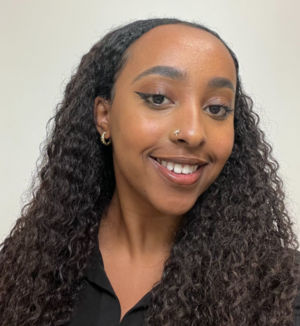Jennifer Tegegne ('23)

Raised in Chicago, Jenny Tegegne ‘23 was a youth activist in high school. She organized with and found community in Asian Americans Advancing Justice’s KINETIC program, a multiracial and multifaith group of young refugee and immigrant students. She saw KINETIC achieve wins for Chicago immigrants. The group saw a sanctuary city resolution passed, successfully changed bilingual education policy, and pushed for Chicago Public Schools to adopt a sanctuary district policy.
Chicago youth organizing, like the kind Jenny participated in, is at the heart of Jenny’s senior capstone: “The Chicago Youth Movements Oral History Project: Documenting Abolitionist Youth Resistance.”
“The feelings, connections, and conversations from which this capstone emerged are mostly grounded in that I had as a Chicago Public School (CPS) student organizer,” Jenny wrote in her capstone.
When Jenny was an organizer for KINETIC, she stood in solidarity with other youth groups such as the No Cop Academy coalition. The No Cop Academy is an effort backed by over 85 Chicago-based community organizations that seeks to stop the construction of a $95 million dollar Cop Academy and use those dollars to invest in marginalized communities. The group formed in 2017 after then-mayor Rahm Emanuel proposed building a Cop Academy in Garfield Park, a predominantly Black neighborhood in Chicago, in response to a Department of Justice investigation on Chicago Police Department’s use of force practices.
No Cop Academy is one of the two youth-led Chicago organizations at the heart of Jenny’s capstone.
The other group is Cops Out CPS, a coalition of community organizations formed in 2020 that seek to end Chicago Public Schools’ contract with Chicago Police Department and remove School Resource Officers from schools.
Through interviews with seven organizers across both movements, Jenny created a digital archive that lives on No Cop Academy’s website for her capstone. The archive includes Jenny’s final capstone and video recordings of her interviewees, along with a brief summary of each interview. The purpose of the archive is to not only document youth advocacy but also show how organizing impacts student relationships to both educational and policing structures.
“I hope the digital archive pushes us to go beyond academic products and encourages more documentation within and of youth movements that strive for abolition,” Jenny said. “There’s a lot of institutional amnesia…where students will come in and do something, and then it will be forgotten by the time it’s like 5-10 years out.”
Jenny found her capstone interviewees by reaching out to her pre-existing network of youth organizers. She compiled a list of names of potential interviewees over the age of 18 who participated in No Cop Academy and/or Cops Out CPS. Jenny asked interviewees open-ended questions, allowing them agency to dictate the structure, length, and tone of the interview.
The interviewees are from a wide range of Chicago neighborhoods and attend(ed) various Chicago schools. Four interviewees identified as Black and three identified as Latinx. Of the interviewees who answered, three identified as cisgender women, and three identified as non-binary or gender fluid. All interviewees came from low-income backgrounds; they were all eligible for free/reduced lunch and many talked about their experiences living in government buildings and communities from which the government disinvested.
Jenny heard many stories from the seven youth activists. Rubi Mendez shared her experience at the picket line to support the Chicago Teachers Union. Meron Tegegne discussed her efforts in leading a school walkout to demand more humane immigration policies. Catlyn Savado called for society to not romanticize the work of youth activists. Other activists shared stories that were just as powerful and valuable.
Jenny took a number of important lessons away from the seven stories. She found that young people are excited to share their stories and victories with others. She also found that youth organizers wish they didn’t have to organize around a particular issue and instead wish they could just enjoy their youth. But in light of injustice, young people have no choice but to organize — and are more than able to successfully do so — Jenny found.
Jenny is excited that the stories of seven youth Chicago organizers are up online for the world to see.
“It is this very archive that keeps me inspired and solidifies my commitment to investing time and energy into youth organizing spaces,” Jenny wrote in her capstone. “Ultimately, this capstone project has reaffirmed my faith in youth as legitimate knowledge producers, agitators, and agents of revolutionary change.”